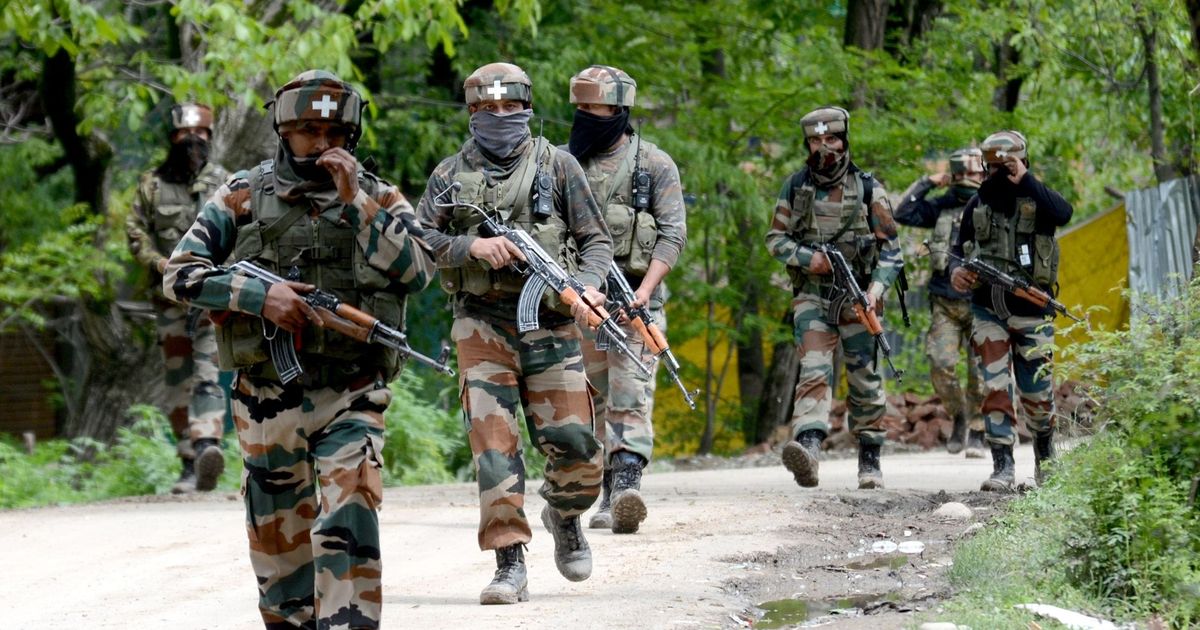
Image Courtesy: Scroll.in
https://bharatshakti.in/the-need-for-military-rebalance/
Editor’s Note
Our three Strike Corps are poised to sweep west into Pakistan while we have only one Strike Corps – in the making – to be fielded against the Chinese. With the increasing pitch of Chinese belligerence there is a requirement for us to pivot our strengths to the north and east so as to be able to deter China better along our land borders.
The author also takes into account the importance of Malacca Straits for the Chinese, and the requirement of our beefing up our strength on our islands to strengthen our deterrence, as far as the Chinese are concerned.
The author also takes into account the importance of Malacca Straits for the Chinese, and the requirement of our beefing up our strength on our islands to strengthen our deterrence, as far as the Chinese are concerned.
THE NEED FOR MILITARY REBALANCE
Pakistan has been our traditional adversary. Accordingly, our military might is poised against it. Post Doklam our differences with China are only widening. The day is not far when, besides jostling and stone throwing, bullets and more may fly. With increased Chinese assertion in world affairs, the strategic kaleidoscope is fast changing. Prophetically, Mr George Fernandes had stated that China is our main adversary. There is a veiled but unmistakable Chinese animosity in the air.
There is also a new paradigm of enhanced collusivity between our adversaries. We need to be on top of situations. Ironically, our main strength is not facing our main adversary.
Our major oceanic assets are not being manned to requisite levels. We are not self-sufficient in defense manufacturing. In sum: our Armed Forces are strategically out of balance. It mandates pragmatic stock taking. While steps are being taken to strengthen our Northern borders, we are still facing the wrong direction. We need to think beyond Pakistan. It’s time to Pivot to China unambiguously. We need to be ready to tackle the 360-degree Chinese threat which will only grow in future.
There is also a new paradigm of enhanced collusivity between our adversaries. We need to be on top of situations. Ironically, our main strength is not facing our main adversary.
Our major oceanic assets are not being manned to requisite levels. We are not self-sufficient in defense manufacturing. In sum: our Armed Forces are strategically out of balance. It mandates pragmatic stock taking. While steps are being taken to strengthen our Northern borders, we are still facing the wrong direction. We need to think beyond Pakistan. It’s time to Pivot to China unambiguously. We need to be ready to tackle the 360-degree Chinese threat which will only grow in future.
Pakistani Predictability
Pakistani delusion is predictable. It is geared to thwart the (non) existential threat from India. Its strategic mindset hinges around nuclear sabre rattling, conventional defense and sub-conventional offense. With the CPEC rolling out,
this thinking will change. While CPEC is a self –proclaimed game changer for Pakistan; it is also their major vulnerability hereafter.
this thinking will change. While CPEC is a self –proclaimed game changer for Pakistan; it is also their major vulnerability hereafter.
Image Courtesy: The Times of India
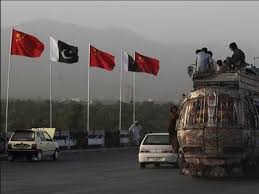
The internal threat to CPEC has mandated raising of two Divisions worth of force to guard it. A new internal front has been created. If, at inception, the game changer of Pakistani fortunes is in danger then the strategic behavior of Pakistan must and will change. Pakistan will continue with nuclear sabre rattling and being conventionally defensive. However, sub-conventionally, even if it wants to remain offensive, it will be forced into a defensive corner. The world is getting a little fed up with Pakistani behavior.
In such a situation is there a need to have our major conventional reserves committed against Pakistan, when enough sub conventional fissures are being generated by Pakistanis themselves. Internal problems in Baluchistan, Gilgit-Baltistan and Khyber Pakhtunkhwa and external problems with Afghanistan are ramping up.The portents of strain with China is showing up on the CPEC front. Overall, an all-out conventional conflict with Pakistan is in the receding mode.
In such a situation is there a need to have our major conventional reserves committed against Pakistan, when enough sub conventional fissures are being generated by Pakistanis themselves. Internal problems in Baluchistan, Gilgit-Baltistan and Khyber Pakhtunkhwa and external problems with Afghanistan are ramping up.The portents of strain with China is showing up on the CPEC front. Overall, an all-out conventional conflict with Pakistan is in the receding mode.
Identifying Imbalance
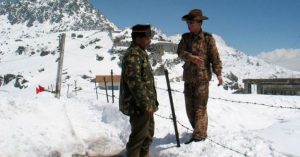
Doklam Standoff (Image Courtesy: Indiatimes)
A Pivot to China only reiterates the obvious and apparent. The two questions are – How can we be balanced conventionally in relation to the Chinese threat? What do we do sub conventionally? If China can talk of interfering in J&K and go ahead with CPEC violating our sovereignty concerns; we can show them an ugly mirror.
Sub conventional space exists in CPEC, Xinjiang and Tibet. It need not be subversive alone. There is plenty of political space if there is political will. At this stage, I will simply say – Adopt the theory of unrestricted warfare as propagated and practiced by the Chinese themselves.
Let’s now see how our conventional forces are structured and disposed. The terrain along the LOC and border with Pakistan is mountainous in J & K, descending to the plains of Jammu and Punjab and deserts of Rajasthan. The LAC with China is entirely mountainous and mostly in high altitude. All borders are held by defensive formations suitably structured and equipped as per the terrain.
For offensive purposes, we have our Reserves– commonly known as Strike Corps. For any country, the entire strategic game revolves around its Reserves – how they are structured, placed and brought into play. It’s here that we are imbalanced and a fresh look is needed.
Sub conventional space exists in CPEC, Xinjiang and Tibet. It need not be subversive alone. There is plenty of political space if there is political will. At this stage, I will simply say – Adopt the theory of unrestricted warfare as propagated and practiced by the Chinese themselves.
Let’s now see how our conventional forces are structured and disposed. The terrain along the LOC and border with Pakistan is mountainous in J & K, descending to the plains of Jammu and Punjab and deserts of Rajasthan. The LAC with China is entirely mountainous and mostly in high altitude. All borders are held by defensive formations suitably structured and equipped as per the terrain.
For offensive purposes, we have our Reserves– commonly known as Strike Corps. For any country, the entire strategic game revolves around its Reserves – how they are structured, placed and brought into play. It’s here that we are imbalanced and a fresh look is needed.
Dichotomy and Imbalance of Reserves
Our Reserves are the three Strike Corps which are fully equipped and capable of operating in plains and deserts only. Each of the Strike Corps has an Armored Division, an Artillery Division and two RAPIDS (Reorganized Plains Infantry Divisions (each has an armored brigade)). They are equipment heavy with a significant bias towards Pakistan – mental, moral and physical. They cannot operate as a cohesive force in mountains. For the mountainous regions facing Pakistan and China there are some mountain capable reserves which contribute to defensive potential and generate very little offensive capability. Raising of the new Mountain Strike Corps has commenced to generate offensive capability. But it will be effective in future only. In case of an emergency, forces from the three Strike Corps will need to be shifted to the Chinese border- primarily to fill gaps and beef up defenses. At no stage will we be able to generate a significant offensive capability through our Reserves even after our Mountain Strike Corps is
raised (for many reasons).
raised (for many reasons).
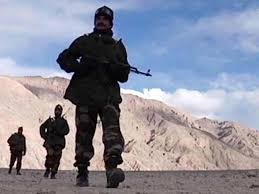
Image Courtesy: NDTV
The dichotomy and Imbalance lies here – our three fully equipped Reserve (Strike) formations are poised towards Pakistan – which is a receding conventional threat. Against our major adversary – China – we will have only one Mountain Strike Corps some time in future. If China has dared to do what it has in Doklam – issue naked threats and warnings with the caveat of teaching us a lesson – it is because it knows that we do not have any credible offensive capabilities against it. If credible offensive capability existed, Chinese behavior would have been different. Can credible offensive capability be built? Yes. It can be done within existing resources. Provided we think it through with an open and sensible mind.
Unfetter Reserves- Enhance Potency
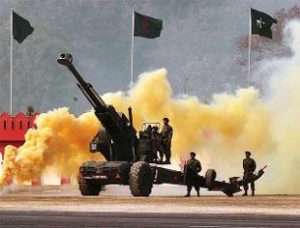
Image Courtesy: The Economic Times
There is a truism. Any force structured, equipped and capable of operating in the mountains can operate in the plains and deserts with some additionalities. The vice versa may not be not true. The critical issue being mountain capable equipment. The entire border with China is in the high Himalayas and mostly in high altitude terrain. The two major arms which dominate mountain warfare are Infantry and Artillery. Role of Armor is very limited to a couple of sectors only.
Hence, if all our Strike Corps are based on mountain capable Infantry and Artillery they will meet the purpose eminently along our Northern Borders. With prepositioned additionalities and equipment, they can be employed against Pakistan also.
The proposal is that all our Strike Corps should comprise of two Infantry Divisions and an Artillery Division with mountain capable guns like the Ultra Light Howitzers, Dhanush, Bofors and Light Field guns as also long-range Vectors.
Resultantly, all our four reserve formations can be brought to bear against China the way we want and when we want. Of course, we need to build up our infrastructure and factor in a percentage of Rapid Reaction Force capability. The day we commence doing this, many coins will fall into their slots.
There will be questions on this line of thinking. Many will advocate status quo. However, another truism is conferred by nature and topography which needs understanding. Any offensive from Tibet funnels down into the narrow Himalayan Valleys on our side. Any offensive towards Tibet expands into open space. We have the offensive advantage if we can structure ourselves suitably and have an intent to change.
Time to think differently? Surely. Risk involved? Minimal. Additional resources needed? Nix. All within existing resources. It is only a re-arrangement of the mind space. That is the challenge. Think of the Ardennes offensive model and answers will start appearing.
Hence, if all our Strike Corps are based on mountain capable Infantry and Artillery they will meet the purpose eminently along our Northern Borders. With prepositioned additionalities and equipment, they can be employed against Pakistan also.
The proposal is that all our Strike Corps should comprise of two Infantry Divisions and an Artillery Division with mountain capable guns like the Ultra Light Howitzers, Dhanush, Bofors and Light Field guns as also long-range Vectors.
Resultantly, all our four reserve formations can be brought to bear against China the way we want and when we want. Of course, we need to build up our infrastructure and factor in a percentage of Rapid Reaction Force capability. The day we commence doing this, many coins will fall into their slots.
There will be questions on this line of thinking. Many will advocate status quo. However, another truism is conferred by nature and topography which needs understanding. Any offensive from Tibet funnels down into the narrow Himalayan Valleys on our side. Any offensive towards Tibet expands into open space. We have the offensive advantage if we can structure ourselves suitably and have an intent to change.
Time to think differently? Surely. Risk involved? Minimal. Additional resources needed? Nix. All within existing resources. It is only a re-arrangement of the mind space. That is the challenge. Think of the Ardennes offensive model and answers will start appearing.
Enhancing Force Potential
What do we do with our perpetual trouble maker- Pakistan? Our defensive Corps can handle any conventional offensive from Pakistan with their present capability without the Strike Corps coming into play. In fact, they have adequate residual strength to even undertake shallow offensives into Pakistan, if needed. If our Defensive Corps are given the Armored Divisions and Brigades which the Strike Corps shed, they will be strong enough to handle all Pakistani designs and still pose a credible conventional threat. However, for deep objectives they will still
need additional Infantry and Artillery. This can still be allotted from the Strike Corps, if ever needed. Force levels don’t change. Force potentials change.
need additional Infantry and Artillery. This can still be allotted from the Strike Corps, if ever needed. Force levels don’t change. Force potentials change.
Battle of the Mindspace
Our major reserves need to be light and essentially mountain capable with dual tasking. That way we will have four reserve formations, ready to swing any way to handle all threats even if they are from both fronts. The Pivot Corps duly reinforced by Armored Divisions and Brigades will be more than a handful for Pakistan to handle. The battle is in the mindspace, requires innovation with least cost and maximum pay off.
Pressure on the Malacca Carotid
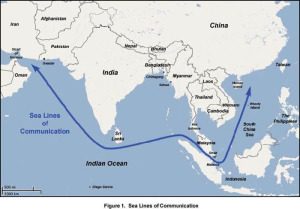
Image Courtesy: SouthAsia Speaks
While we can think and debate about our extensive land borders, our focus on the Malacca Straits has to increase. Whether the Belt and Road Initiative and CPEC are successful or not, the Malacca bottleneck will remain a Chinese
vulnerability. It is the Chinese carotid artery which can be pressurised. Hence, we need a truly potent three-dimensional strike element in Andaman and Nicobar Islands.
As of today, the individualistic thinking of the Army, Navy and Air Force is that this major National Strategic Asset is not their baby! This needs a major re-focus which can only come from an integrated approach. India cannot commit the mistake of too much focus on land borders and neglect its aces in the Indian Ocean. We need to be clear headed. The Andaman and Nicobar Command must be made more potent than now. Assets for this jewel of ours must be of a
vulnerability. It is the Chinese carotid artery which can be pressurised. Hence, we need a truly potent three-dimensional strike element in Andaman and Nicobar Islands.
As of today, the individualistic thinking of the Army, Navy and Air Force is that this major National Strategic Asset is not their baby! This needs a major re-focus which can only come from an integrated approach. India cannot commit the mistake of too much focus on land borders and neglect its aces in the Indian Ocean. We need to be clear headed. The Andaman and Nicobar Command must be made more potent than now. Assets for this jewel of ours must be of a
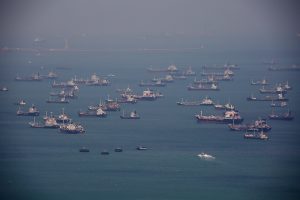
Image Courtesy: NipponFoundation.or.jp
permanent nature and not on a temporary/ ad hoc basis. The day we give teeth to Andaman and Nicobar forces our Pivot to China will be more potent.
Self – Sufficiency
We are a rising power which must be militarily strong through self- sufficiency. Lack of self-sufficiency in military equipping capability keeps us off balance, big time. A rising power cannot be one of the highest net importers of defense equipment for the next decade. The need is for a fundamental change in the way we go about our defense acquisitions as a National Strategy. We have the option of continuing to be how we are. However, it’s a luxury that India can no more afford. The scene is changing and so should we. We must do more with less. It can be debated, discussed and suitably adopted. It can only be ignored at great cost and peril to ourselves.
Lt Gen P R Shankar (Retired)
(Disclaimer: The views and opinions expressed in this article are those of the author and do not necessarily reflect the official policy or position of BharatShakti.in

Comments
Post a Comment